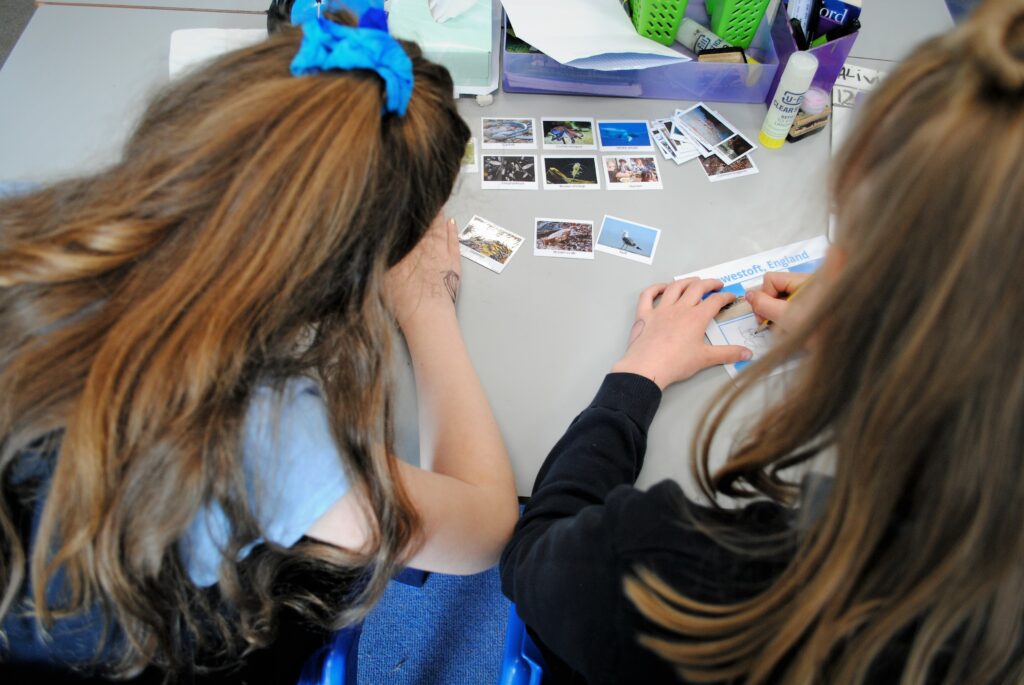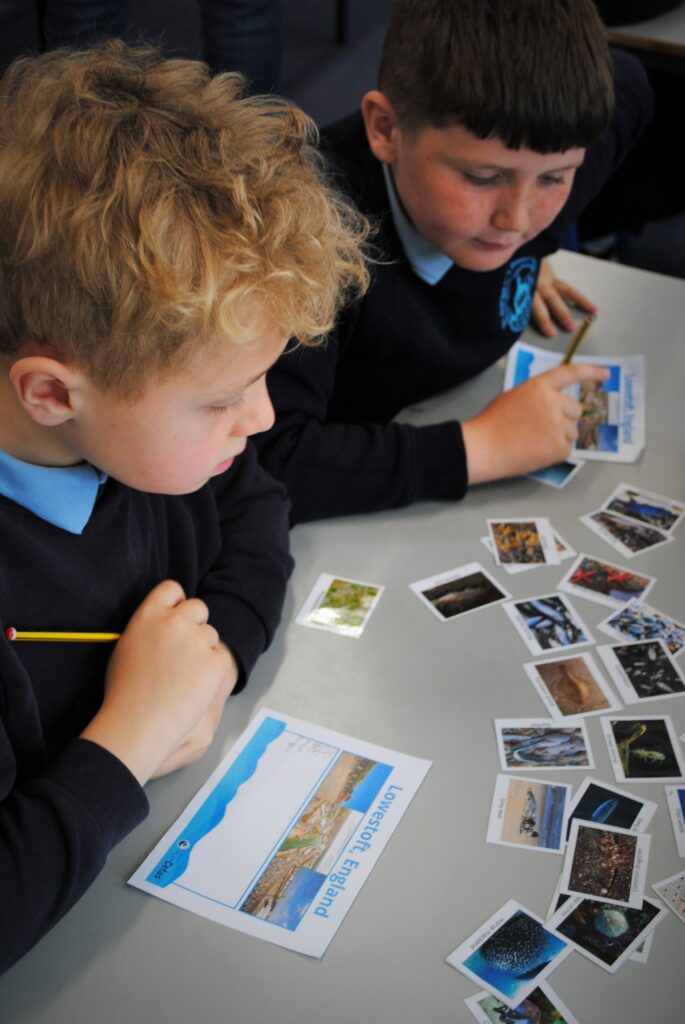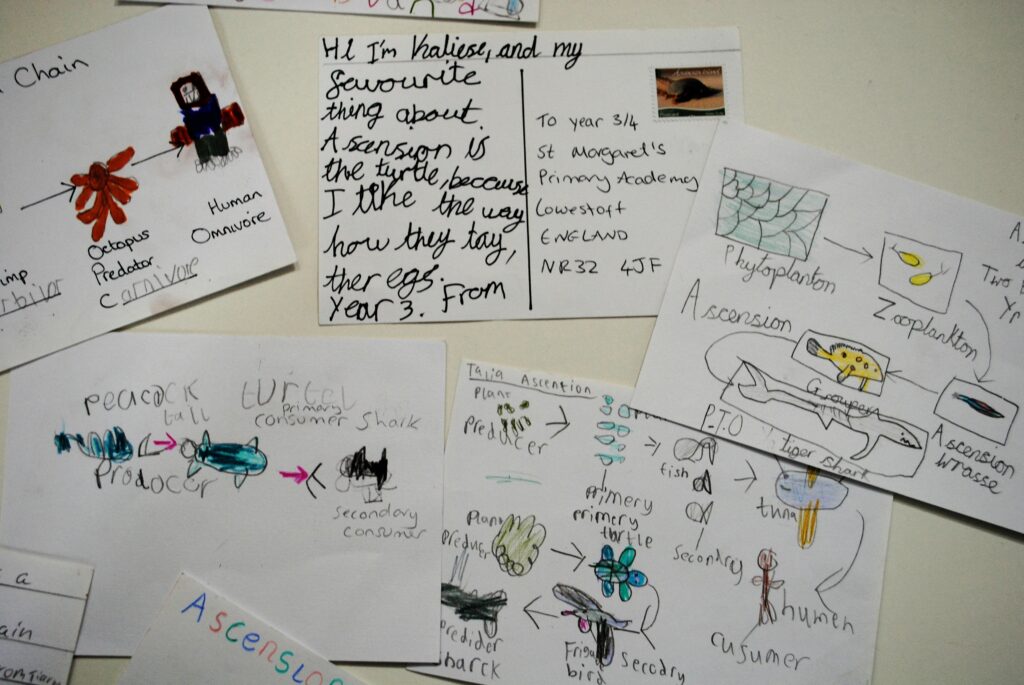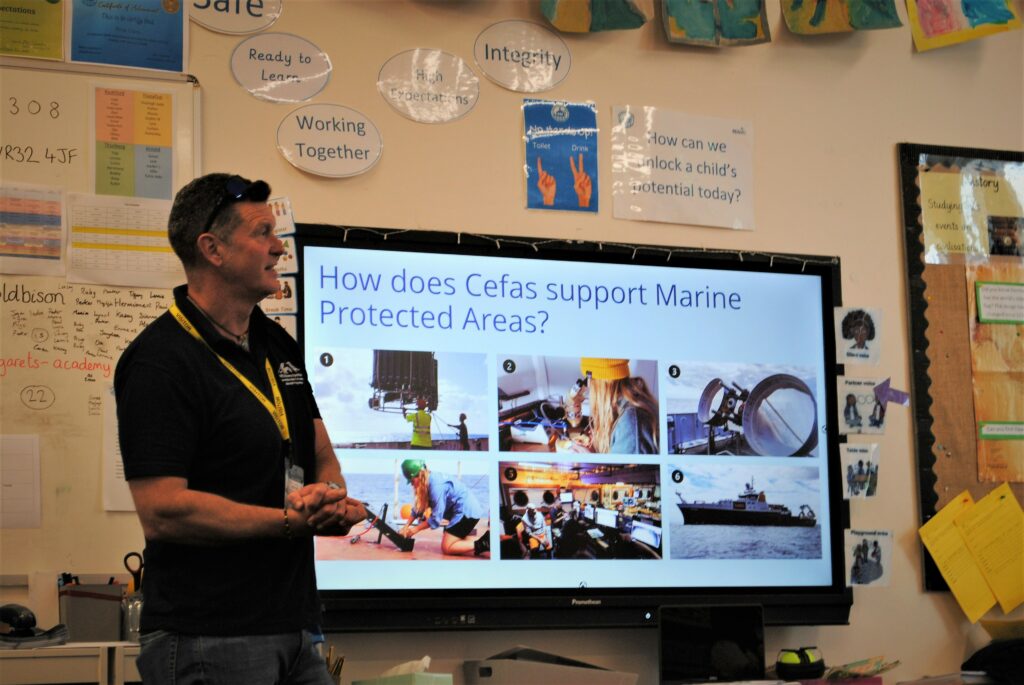
Despite being separated by more than 7,000 kilometres and located in opposite hemispheres, with the diverse climates and marine environments of the South Atlantic and North Sea, a ground-breaking primary school twinning project, supported by Cefas and Ascension Island, has shown that a shared passion for nature is a powerful force in bringing together two different communities. Cefas Engagement Officer, Rachael Mann reflects on the launch of this unique approach to STEM learning.
Forging new local links
Last year, following a career in teaching, I joined Cefas’ new engagement team to work with a range of external partners and science colleagues to help bring Cefas’ science to a wider audience, including education and community settings, with the aim of inspiring the next generation of aquatic scientists and supporting a wider understanding of the critical importance of sustaining healthy and productive marine ecosystems.
As part of my role, I have been working with Head Teacher, Zara Lambert of Lowestoft’s St Margaret’s Primary School, to develop a partnership to bring the aquatic environment into the classroom and young people outside for opportunities to learn first-hand about their local marine habitats. As the largest employer in Lowestoft, Cefas offers a unique perspective, as a national science institute operating both in the UK and internationally, in some of the most remote islands in the world.

Bridging the 7,000 km divide
Since 2016, Cefas has been working to help develop and protect the precious aquatic environments of a number of the UK Overseas Territories (UKOTs), through the UK Government’s Blue Belt Programme. The UKOTs, including Ascension Island, are home to around 90% of the UK’s biodiversity and host a huge range of unique and endangered species, some of which are found no-where else on earth.
The twinning partnership between St Margaret’s Primary School in Lowestoft and Two Boats School in Ascension is connecting two diverse educational settings, with the support of the Blue Belt Programme and an ambition of working together to find out more about each other’s marine environment, the species that live there and what they can do to protect and restore nature. By providing students with an understanding of the importance of our oceans and how to protect them, they will be able to make informed and responsible decisions regarding the ocean and its resources in the future.
A tale of two schools
In the initial session, students from both schools sent and received video messages introducing themselves and describing their local marine environments. Cefas and Ascension Government provided in person teaching sessions at their respective schools where the young people created postcards depicting their local food chains. These were then despatched to their twin school so that students could compare and contrast the food chains found in the two locations. It was great to be back in the classroom and a privilege to observe the school children marvelling at the different wildlife found around our coast. Many a student was shocked by the discovery that we have sharks in our waters too!

Two Boats School- Ascension Island
Two Boats is the only school on Ascension Island with just 60 pupils ranging in age from 4-17 years old.
Lorna West, Ascension Government Engagement Officer, said:
I love sharing my passion for the marine environment and wildlife with the children of Two Boats School. Recently we twinned with St Margaret’s School in Lowestoft to compare Ascension’s food webs with food webs in the UK. The children were very excited to help St Margaret’s learn about Ascension and create some beautiful postcards. They are keenly waiting for their reply.
St Margaret’s Primary Academy- Lowestoft, England
St Margaret’s Primary Academy in Lowestoft partnered with Cefas in 2022 to support the development of Cefas’ education programme. The school is much larger than Two Boats with approximately 420 students. Through the partnership, Cefas will create educational resources linked to the UK National Curriculum to enhance STEM learning and development. These will be developed and trialled with St Margaret’s before being made accessible to the public via the external Cefas website. All resources will be underpinned by the latest Cefas Science and support the upcoming Natural History GCSE set out by the Department for Educations (DfE’s) Sustainability and Climate Change Strategy.
Miss Zara Lambert, St Margaret’s headteacher, said:
We are incredibly excited to be working in partnership with Cefas. Our focus as a Green Flag Eco school is to ensure that all children have an education that enables them to have a positive impact on their planet. Twinning with Two Boats school is the definition of unlocking the potential and broadening the horizons of our community. It is an exquisite partnership that will enable our pupils to strengthen their resolve in both their local responsibilities and actions as global citizens.
A shared passion

Now the students from both schools understand which species live in their marine environments, they will be taught about the Marine Protected Areas (MPAs) that help sustain them. For example, students will learn about the valuable work the Blue Belt Programme and Ascension Island do to support Ascension’s vast MPA, which protects the island’s delicate ecosystems. Students will continue to correspond via letters, email and the sharing of video content. Together, they will learn more about our ocean and how to protect it.
It’s been inspiring to work with the children in Lowestoft and Ascension. Although these schools are different in many ways, it’s abundantly clear that they enjoy a shared passion for the natural environment and a commitment to make a difference to the world they live in. Since this initiative, Cefas has received interest from other UKOT schools seeking to develop similar twinning projects. I am hopeful that the work we are developing with St Margaret’s and Two Boats will have a much wider impact than we originally envisaged.
Contribution: Rachael Mann, Cefas Engagement Officer
For any further information, email communications@cefas.co.uk